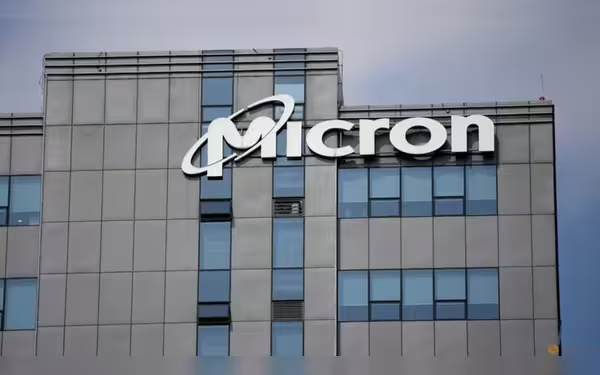Saturday, November 16, 2024 09:34 PM
Micron Technology Projects Record Revenue Amid AI Chip Demand
- Micron forecasts $8.7 billion revenue for Q1 2024.
- Strong demand for memory chips driven by AI technology.
- HBM chips sold out for 2024 and 2025 calendar years.
 Image Credits: channelnewsasia
Image Credits: channelnewsasiaMicron Technology anticipates $8.7 billion revenue in Q1 2024, driven by strong AI chip demand.
Micron Technology, a leading player in the semiconductor industry, has recently made headlines with its optimistic forecast for the first quarter of the fiscal year. The company, known for producing memory chips, has seen its shares soar by approximately 14 percent in after-hours trading. This surge is attributed to strong demand for its memory chips, particularly those used in artificial intelligence (AI) computing.
Micron is one of only three companies globally that manufacture high-bandwidth memory (HBM) chips, alongside South Korea's SK Hynix and Samsung. This unique position has allowed Micron to capitalize on the growing demand for semiconductors that are essential for powering generative AI technology. HBM chips are a type of dynamic random access memory (DRAM) that are not only space-saving but also power-efficient, making them crucial for AI-focused graphics processing units (GPUs) that process large volumes of data.
During a recent conference call with analysts, Micron's CEO, Sanjay Mehrotra, emphasized the strong demand from data center customers, stating, "Demand from data center customers continues to be strong and customer inventory levels are healthy." This positive outlook is further supported by the company's announcement in June that its HBM chips, which are integral to AI processors designed by Nvidia, are already sold out for the 2024 and 2025 calendar years, with pricing already set.
Micron anticipates reporting record revenue of approximately $8.7 billion, with a margin of plus or minus $200 million, for the first quarter. This forecast exceeds analysts' expectations, who had predicted revenue of $8.28 billion and an adjusted gross margin of 37.7 percent. The ongoing AI boom has significantly helped Micron mitigate the impact of a memory chip inventory surplus in the personal computer (PC) and smartphone markets.
As personal computers increasingly incorporate AI technologies, the demand for memory chips is expected to rise. AI PCs may require over 30 percent more DRAM, and with Microsoft's initiative to encourage users to upgrade to Windows 11, the market for commercial PCs is likely to expand, particularly in 2025. Kinngai Chan, a senior research analyst at Summit Insights, noted the potential for growth in this sector.
Micron's performance often sets the tone for the entire chip sector, as it reports its results ahead of its competitors and serves a diverse client base across the PC, data center, and smartphone industries. Sumit Sadana, Micron's Chief Business Officer, stated, "HBM, high capacity memory, and data center flash storage, each of these three product categories will be multiple billions of dollars in revenue in 2025." For the first quarter, the company is forecasting an adjusted profit of $1.74 per share, with a margin of plus or minus 8 cents, surpassing analysts' estimates of $1.65 per share.
Micron Technology's strong forecast reflects not only the company's robust position in the semiconductor market but also the increasing reliance on AI technologies across various industries. As demand for memory chips continues to grow, Micron is well-positioned to benefit from this trend, potentially leading to significant revenue growth in the coming years. This development is a clear indication of how technological advancements are shaping the future of the semiconductor industry, making it an exciting time for investors and consumers alike.













